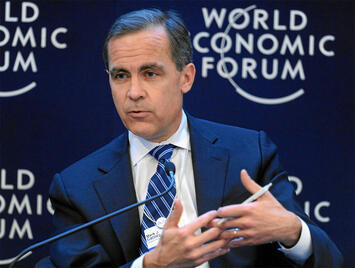
U.S. President Donald Trump’s mindless, and frankly pointless, comments about Canada becoming the 51st state have stirred up latent Canadian patriotism. But it also may result in Canada, which is already economically moribund, further aligning itself with the permanent European Union bureaucracy.
A tilt towards Europe would be natural for Liberal Leader Mark Carney, the former pre-Brexit head of the Bank of England. He’s an advocate of the very environmental, social and economic policies that have led the EU — and, to some extent, Canada — into economic and social decline.
Carney is the ultimate product of the Euro-Atlantic elite, with affiliations with the World Economic Forum, the Bilderberg Group and the Group of Thirty. Recently, he travelled to Europe in a search of “reliable allies” — that is, people who think alike. He has identified as a “European” in the past, and holds British and Irish citizenship.
In office, we can expect him to epitomize the bureaucratic spirit of the profoundly dysfunctional EU. The central organizing principle of the EU is disregard for nation-states. Recent antidemocratic moves to remove troublesome populists in Romania and take out a leading presidential aspirant in France suggests Europe’s most outspoken defenders of democracy frequently toss out results when disappointed.
The rest of the European agenda is no bargain, either. It prioritizes an ever-expanding welfare state, as well as climate, social and immigration policies now rejected in the United States. Its politics, and economics, centre on stasis.
This is a swan song Canadians need to resist. Under the government of former prime minister Justin Trudeau, Canada was already succumbing to the essentials of Euro-politics: high trade barriers, net-zero climate policies, essentially open borders and the systematic undermining of the country’s past.
Climate is a particular challenge. Carney has a long history, including as United Nations special envoy for climate action, of being at the forefront of steering investment to preferred “green sectors.” American investors have already moved away from such commitments.
Read the rest of this piece at: National Post.
Joel Kotkin is the author of The Coming of Neo-Feudalism: A Warning to the Global Middle Class. He is the Roger Hobbs Presidential Fellow in Urban Futures at Chapman University and and directs the Center for Demographics and Policy there. He is Senior Research Fellow at the Civitas Institute at the University of Texas in Austin. Learn more at joelkotkin.com and follow him on Twitter @joelkotkin.
Photo: Michael Wuertenberg, via Flickr, under CC 2.0 License.












